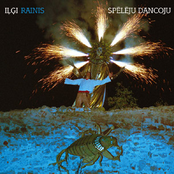Spēlēju, dancoju

Biography
The most famous world folk music band from Latvia Iļģi celebrated their 31st anniversary on April 21, 2012. The group started at the Cultural Centre of Iļģuciems, Rīga, Latvia in 1981 where Ilga Reizniece, a professional violinist, founded an ensemble of Latvian folk music. She had just graduated from the Jāzeps Vītols Latvian Academy of Music and was an active member of two prominent folk music ensembles Bizīteri and Skandinieki of the time. At the beginning Iļģi was an ensemble of authentic La...
The most famous world folk music band from Latvia Iļģi celebrated their 31st anniversary on April 21, 2012. The group started at the Cultural Centre of Iļģuciems, Rīga, Latvia in 1981 where Ilga Reizniece, a professional violinist, founded an ensemble of Latvian folk music. She had just graduated from the Jāzeps Vītols Latvian Academy of Music and was an active member of two prominent folk music ensembles Bizīteri and Skandinieki of the time.
At the beginning Iļģi was an ensemble of authentic Latvian folk music. They visited remote parts of Latvia in search for unrecorded folk songs, studied the traditional performance, as well as sewing their own traditional costumes and building their own instruments. They also performed wherever they could find willing listeners and pass on the knowledge they had acquired as befitted an ensemble of folk music.
The studies of the authentic music led to interest in the ancient history, archeology, ethnography, mythology and traditions. The serious research was the foundation to the development of the ensemble beyond the boundaries of traditional music. Ilga Reizniece reckoned that they have always acknowledged the dual purpose of the group: on one hand they dutifully studied, preserved and taught the authentic performance and tunes, on the other hand all the members of the group were professionals yearning to fulfill their creative ambitions in music.
The search for new means of expression in music inevitably led to recruiting new members in the group. Ilga Reizniece has been there for all the 31 years – from the very beginning of the group. Māris Muktupāvels, the piper and kokle player, has been there for 30 years. At present they are joined by the following musicians: Egons Kronbergs, the guitar, who also plays in the band The Hobos and duet U.K.; Gatis Gaujenieks – the bass, the producer, the director of sound, who also owns a recording studio. He is the former lead singer and bass of the USA based group Akacis. Ilga and Māris met Gatis Gaujenieks while playing in the rock band Jauns mēness; The drummer Martins Linde. At different times the group was joined by skillful and well known Latvian musicians - Juris Riekstiņš, Biruta Ozoliņa, Zane Šmite, Māra Kalniņa, Guntars Gabranovs, Gints Sola, Arnolds Dāle, Jānis Abens, Arnolds Kārklis, Juris Kroičs among the many.
A lot of Iļģi music is aimed for children and teenagers. Ilga has been a music and folk-lore teacher for many years. She has delivered countless courses and lectures on Latvian folk-lore for children and grown-ups alike as well as taken part as a tutor in widely known retreats, like 3X3, in Latvia and abroad. The group loves to perform at schools. In 2004 Iļģi produced a CD Rāmi un ne together with the winners of the singing competition of the childrens’ folk-lore festival Pulkā eimu, pulkā teku (PEPT). The project, concieved by Ilga, drew much needed attention to the annual event.
Throughout the early nineties the instrument choices and the creative pathways of Iļģi music were dominated by the reflective, solemn mood. At the end of the decade it was surpassed by boisterous vivacity instrumented with a set of drums and electric strings. The choice of repertoire shifted towards adaptations of traditional music more suitable for a rock band. This led to the group’s self-proposed label to the style of music they played – post-traditional music. The shift in creativity was brought on by Gatis Gaujenieks joining the group in a capacity of a musician as well as sound artist and producer. Their first joint effort, the CD Saules meita, won The Great Music Award and The Annual Award for the Best Record. Vilnis Strods, Iļģi percussionist, pointed out that the modern sound was more appealing to young listeners and helped to make authentic folk music more popular among those age groups as well as acquainted the younger generation with the traditional values. Saules meita and the following CDs by Iļģi ensured that the traditional Latvian tunes took a permanent place in youths’ music libraries alongside the ubiquitous Western pop music.
While employing the modern musical themes and instruments in their records Iļģi also incorporated the influences of ethnic music from other countries. Their previous work asserted the Celtic and Slavic influences in Latvian music. Ne uz vienu dienu continued this process by incorporating the performances of Samite Mulondo, a well known musician from Uganda, and banjo player Marks Feders.
From 1989 Iļģi have taken part in numerous music festivals in neighbouring Estonia and Lithuania as well as in Russia, Finland, Sweden, Norway, Great Britain, Switzerland, Australia, USA, France, China, and gained both the sympathies of the listeners, and raving reviews from the press. The fact that Iļģi is an integral part of the music world wide was confirmed again in July 2006 when Ne uz vienu dienu was voted the 2nd best European world music recording by the experts of World Music Charts Europe (WMCE). In April 2012 Ilgi's album Tur saulite perties gaja debuted at No. 4 on the WMCE. Read more on Last.fm. User-contributed text is available under the Creative Commons By-SA License; additional terms may apply.
